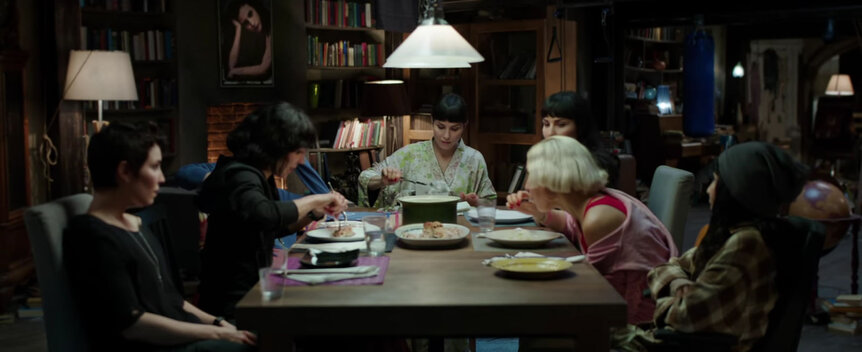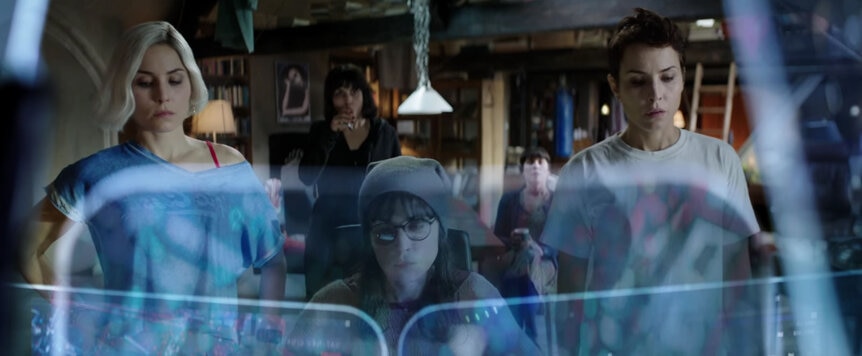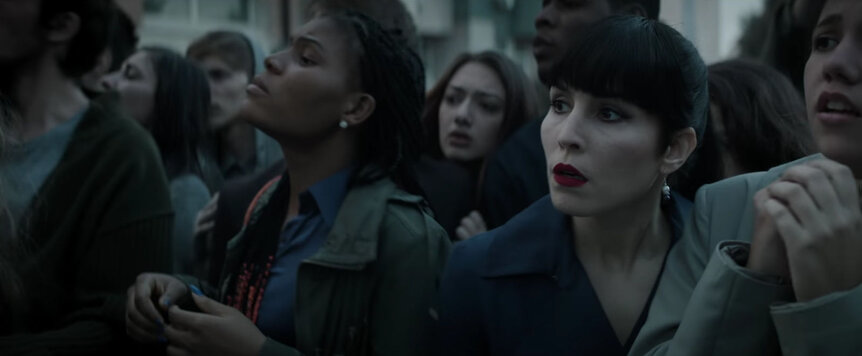Create a free profile to get unlimited access to exclusive videos, sweepstakes, and more!
Not Guilty: What Happened to Monday?

In Not Guilty, we look at movies and TV shows that the general consensus tells us we should feel bad for liking, but that our hearts tell us we should give a second look — "guilty pleasures" we don't feel guilty about. This time around, we turn our attention to the dystopian science fiction sister drama What Happened To Monday?
Dystopian futures have become increasingly redundant for audiences, as the reality of a dystopian present has become apparent for a great percentage of the population of the world — not to mention there are about a billion dystopian futures in genre, and save for a handful of relatively inconsequential details that are changed from take to take, those realities are by and large the same repetitive scenarios.
Tropes around bleak futures in science fiction are many, and telling a story about the future in which things get much, much worse isn’t exactly a shocking plot development at this point. On the other hand, grouping all dystopian future movies together is as unfair as grouping any other kind of movie together, and there are always hidden gems to be found. What Happened To Monday? wasn’t exactly panned, but it’s been holding the line at a less than 60% rating on Rotten Tomatoes, so it’s time to clear the air and celebrate how good this movie really was.
A retro mystery novel title
Crossovers between heady science fiction and lurid mystery is always a lot of fun. There’s something about those genres that just mixes together famously. From comics to movies to novels to whatever medium you can imagine, if you throw a solid murder mystery plotline into a science fiction background, your story immediately rules.
The title is what drew me into this movie, which is why it’s interesting that it was released by the title Seven Sisters in some countries. There were two screenwriters for WHTM?: Max Botkin and Kerry Williamson. According to an interview with Williamson, the script had initially focused on seven brothers that were raised by their mother, but that element was changed to make the story more interesting. Besides that, the script had been intended as a more big-budget and straightforward sci-fi movie, but when the budget was less than expected, it led to script revisions. In the same interview, Williamson said that she believed the shortened budget improved the script and allowed for a greater focus on the interactions between the sisters.
The plot is mighty topical
This film focused on a grandfather whose daughter dies during childbirth, leaving him with the puzzle of how to hide six of his seven granddaughters from a government intent on limiting the number of children born to each household to the point of criminalizing those that break said law. He decides to hide them, naming them Monday, Tuesday, Wednesday, Thursday, Friday, Saturday, and Sunday, but giving them a single shared identity to go into the world, only one at a time. After years of successfully hiding the truth, on Monday’s day, she fails to return home, and the other sisters are forced to figure out where she went.
There are clearly many parallels to the real world in WHTM? Utilizing control and power over women’s reproductive capabilities is classic evil government. A world in which ability to give birth is weaponized against some women is certainly not especially difficult to imagine in the context of the current administration, and it has historical precedence across the world.
The cast is rad
Both Glenn Close and William Dafoe have both been turning out fantastic performances for decades now, and What Happened To Monday? is good in that it allows both of them individual room to show off those acting chops despite neither of them being the focal point of the film. Dafoe’s turn as the troubled grandfather that tries to save his granddaughters from imminent death at the hands of the government is sparse but effective.
Meanwhile, it is a proven fact that I will turn up for any movie in which Glenn Close plays a charming but completely amoral villain whose comeuppance occurs when she is standing near a podium in front of many people (see also: The Stepford Wives). Marwan Kenzari as the love interest of one or possibly all of the sisters is a lot of fun in a fairly limited role and was a great choice for the part.
Noomi Rapace kills it
I did just mention that the cast is fantastic, but there has to be a whole separate conversation about how good of an action hero Noomi Rapace really is in this movie. There were indeed some critics that really leaned every way they could to sell her short for this performance, but she stars as septuplets of the future in a bitter game of cat and mouse with herself. Imagine playing seven different personalities in a single movie and managing to give them each different vibes. Rapace already had a pretty solid international following after her role as Lisbeth Salander in the Millennium film series, but she continues to impress with her take on the many characters she plays here, each with their own epic mix of jealousy, numbing traumas, and action hero aplomb.
It’s a dystopian future that actually focuses on women
This is a rare thing indeed. Naturally, when science fiction has focused its eyes on the potential horrors of the future, it has generally neglected to give much attention to the gender that is guaranteed to be adversely affected by any and all dystopias. Although via works by women like Octavia Butler, Ursula K Le Guin, N.K. Jemisin, and many more, women are given much greater focus, the fact remains that the vast majority of frightening futures in fiction, especially in film, focus on the societal group least like to experience negative side effects as a result of them. Putting the family dynamic between the sisters at the forefront is primarily what made this film so interesting. By giving viewers a different personal angle than what is typical, it raises the stakes of the film for many. Indeed, attempts to control women's bodies and the horror that results is primary to the story.
There is, meanwhile, the entirely valid complaint that when warnings of a government potentially sterilizing women are brought up in science fiction and the emphasis is on white women, it neglects Black and Native women in the United States that have been forced to undergo what is termed “compulsory sterilization.” Other communities affected by the eugenics-based concept include intersex and transgender people, who have often been forced through the process in countries across the world. Meanwhile, disabled people are almost unfailingly the subject of extreme hatred and cruelty in eugenics-based ideologies, and sterilization has thus been a constant threat. It is important to note that what is considered a dystopian future for white women is a historical fact for many marginalized communities.
On the other hand, by asserting a wealthy white woman that buys into the lies of her own regime as the major villain of the story and an obstacle for women's reproductive rights, What Happened To Monday? might be closer to reality than it's given credit for.
Upon its release, critics complained that the characterization of the sisters was thin, which seems a little unreasonable for a 90-minute long murder mystery action movie dystopian future trying to pack in substantial social commentary while methodically killing off much of its core cast of characters. There have been suggestions that What Happened To Monday? will thrive as a cult film, which I likewise believe to be the case.
Focusing on the less fleshed out aspects of the characterization is to miss the point of this movie, which is that it successfully balances multiple genres. Soap opera, murder mystery, apocalyptic futures: What Happened To Monday? really has it all, and the fact that this would have worked better as a TV series in which the subtleties of the characters could have been explored more isn’t exactly the fault of anyone that worked to bring us this romp.
What Happened To Monday? was one of the most interesting movies of 2017, a year in which the future detailed in the film did not seem particularly far removed from the reality of living in the United States, where immigrant children are held in camps and women’s essential autonomy is under constant attack. Obviously, this movie doesn’t have a ton of time to address the nuances and complexities of its world, but it does give a surprisingly hopeful view. Even when the chips are down so low it seems that everything is surely lost, it’s the tenacity of the surviving sisters that gives the movie a positive if brutal vibe.
Let’s face it; every now and again, even a dystopian future needs a happy ending.





























